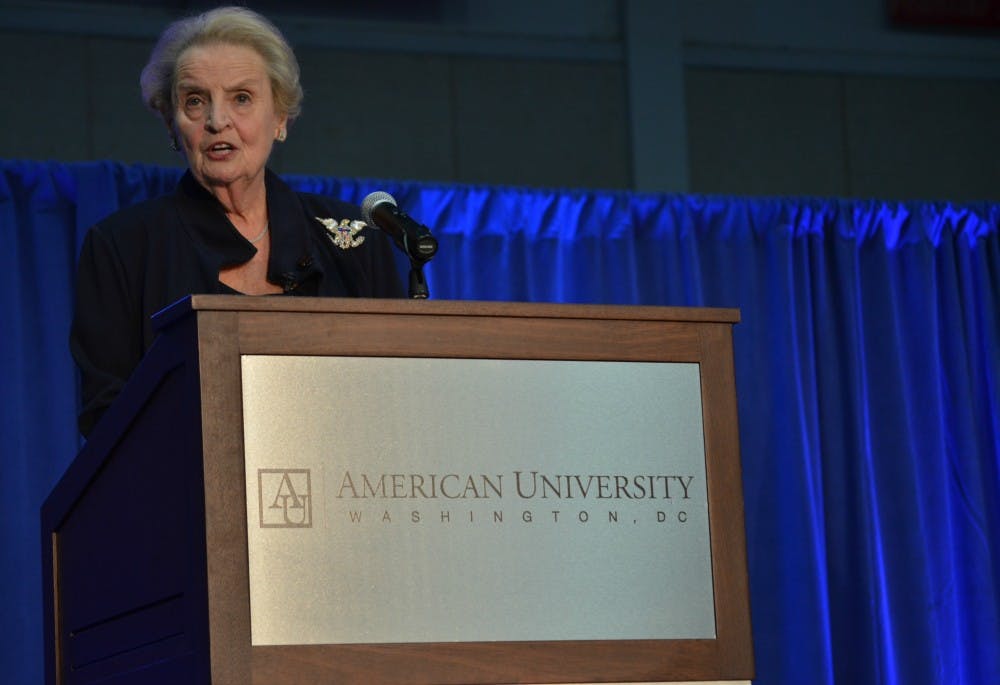Former United States Secretary of State Madeleine Albright spoke about the need for young people to take risks in ensuring global peace and security at an event in Bender Arena on Oct. 17.
In the speech, sponsored by the Kennedy Political Union in collaboration with All-American weekend, Albright related her initial doubts about being the first female Secretary of State to anxieties of young people today. She highlighted that maintaining personal security, finding stable jobs and forming close-knit families and communities has become increasingly difficult.
“For students there is often more pressure to be part of the crowd then to rise above it,” Albright said. “A life without risk is hardly a life at all. Set goals in life that are more ambitious than job security, financial security or the kind of security that comes from your peers by following the crowd.”
The expanse of globalization and technology are two of the biggest challenges faced by the younger generation, Albright said.
“The double edge sword of globalization has connected us, but it is faceless.” Albright said. “The other double edge sword is technology, which has done incredible things in terms of making it possible for farmers in Kenya to pay their bills on their mobile phones. On the other hand, it has completely disaggregate people’s voices. Now everybody has their own way of communicating and listening to the things they already agree with and therefore not broadening their knowledge.”
Born in Czechoslovakia, Albright moved to England during World War II and, at 11 years old, came with her family to the United States. Her father was Czechoslovakian diplomat, though exiled before the start of World War II, and later became Czechoslovakian ambassador to Yugoslavia. When they moved to the United States, her father worked as a professor of International Relations. Due to her father's’ professional experience and her schooling, Albright grew up knowledgeable about foreign relations and political science.
“When I moved here I spoke English, Czech and French, I just didn't speak American. I worked very hard to become an American,” Albright said in an interview with The Eagle prior to the event.
When she graduated Wellesley College in 1959, Albright intended to become a journalist, though the career never materialized, she said. At 39, she had her first professional job working as Chief Legislative Assistant for former Maine Sen. Ed Muskie (D). From there, she worked at the White House as a congressional liaison for the National Security Council.
In 1993, Albright served as the Ambassador to the United Nations under President Bill Clinton. She became Secretary of State four years later. During her time in office, she advocated for more integration of women’s issues in international politics.
“I decided it was very important to bring women’s issues into foreign policy, not just because I am a feminist but because we know societies are more stable when women are politically and economically empowered,” Albright told The Eagle.
Albright faced criticism before taking office as Secretary of State, and opponents scrutinized her cabinet hiring decisions.
“People didn't think a woman could be Secretary of State,” Albright said. “The history of women in the foreign service has been very bad. There have not been a lot in the foreign service and previously when a women got married she had to leave.”
In her speech, Albright said she was doubtful of becoming Secretary of State because there had never been a woman in the position before. She recalled her experience walking to her office for the first time.
“I remember walking to my office for the first time and passing through a hallway with portraits of the former male secretaries of states distinguishable by whether they were clean shaven or had beards. I was thinking that when my portrait went up, the walls of the hallway would shake,” Albright said during her speech. “When my portrait went up, the hallways did shake.”
During her time in office, Albright said she and the Clinton Administration were criticized for sanctions in the Gulf War, a lack of response to the ethnic genocide in Rwanda and the accidental U.S. bombing the Chinese Embassy during of war in Kosovo.
“The hardest part about making decisions is the unintended consequences of foreign policy decisions, and you really can't tell where they are going to,” Albright said.
In a discussion of current politics, Albright enthusiastically supported Hillary Clinton as the best presidential candidate.
“I don't think there has ever been anybody running for president that is more prepared for foreign policy or anyone more experienced than her,” Albright said. “There is no one I know better at understanding domestic and foreign policy.”
ksaltzman@theeagleonline.com





